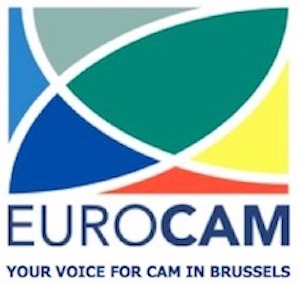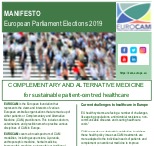The contribution of CAM in the treatment of NCDs EUROCAM urges EU political leaders to take action
EUROCAM calls on the European Parliament, the Commission and the Council, in the 2019-2024 legislature, to include CAM in their policies to tackle Non-Communicable Diseases (NCDs).
Non-Communicable Diseases, the number one cause of death and disability worldwide
NCDs, including cancer, cardiovascular disease, chronic respiratory diseases and diabetes account for 70% of all deaths and more than three out of four years lived with a disability. Up to 80% of health care budgets across the EU are spent on treating chronic diseases, the total costs for EU economies being €115 billion.[1] Prevention is key to avoid ill health and achieve a high level of mental and physical well-being effectively and efficiently. Healthy lifestyle modifications including nutritional counselling, exercise training, and stress management techniques improve outcomes for patients at risk and for those who already have common NCDs. If lifestyle modifications alone are not sufficient to restore health, CAM modalities are especially appropriate to support and induce the self-regenerating process of the individual. With the aid of medicines of natural origin and the patient’s own commitment to change, CAM aims to restore health. Improving health implies reducing not only the disease process but also the susceptibility to illness and disease. This diminishes the need for conventional drugs and high-cost medical interventions.
EUROCAM calls on the EU political leaders to
- Encourage Members States to take note of World Health Assembly resolutions WHA62.13 and WHA67.18 that urged the Member States to:
- integrate Traditional Medicine (TM) and CAM within national healthcare systems by developing and implementing national TM policies and programmes;
- promote the safety, efficacy and quality of TM/CAM by expanding the knowledge base and providing guidance on regulatory and quality assurance standards;
- establish systems for the qualification, accreditation or licensing of TM/CAM practitioners;
- increase the availability and affordability of TM/CAM.
- Encourage Member States to take note of the WHO’s Traditional Medicine Strategy 2014-2023, which support Member States in developing proactive policies and implementing action plans that will strengthen the role Traditional Medicine (TM) and CAM plays in keeping populations healthy;
- Support Member States with knowledge transfer of integration of conventional medicine and CAM to enable more effective, accessible and resilient health systems;
- Promote the inclusion of CAM in all possible EU public health policy and programmes dealing with health education and promotion, prevention and treatment of chronic disease, health inequalities, and active and healthy ageing;
- Improve EU legislation and regulation of CAM medicinal products, practices and providers, and facilitate their free circulation.
References
[1] OECD/EU (2018), Health at a Glance: Europe 2018: State of Health in the EU Cycle, OECD Publishing, Paris. https://doi.org/10.1787/health_glance_eur-2018-en

